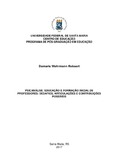| dc.creator | Robaert, Damaris Wehrmann | |
| dc.date.accessioned | 2021-04-06T17:26:52Z | |
| dc.date.available | 2021-04-06T17:26:52Z | |
| dc.date.issued | 2017-05-30 | |
| dc.identifier.uri | http://repositorio.ufsm.br/handle/1/20486 | |
| dc.description.abstract | This research approaches possibilities and challenges concerning the articulation
between areas of Education, Psychoanalysis and Initial Teachers Formation. The
primary objective is in understanding the ways in which the psychoanalysis could
improve the education and the initial training of teachers of teenagers, given that
such an area is focused in thinking subjective aspects that are implicit and related to
the formation of the psychic structure. Such aspects, very present in teaching
profession, are also often forgotten in the pedagogical practice. Hence, this is a
bibliographical research based on the qualitative approach and on Philosophical
Hermeneutics (GADAMER, 2004) using them as main guiders. It is based on authors
such as Freire (1996, 2014, 2015), Nóvoa (1992, 2009), Imbernón (2010, 2011),
García (1999), Gatti (2000, 2010) e Arroyo (2013), of Education and Teachers
Formation areas; and, Freud (1913, 1914, 1919, 1925, 1933), Kupfer (2001, 2013),
Mrech (1999, 2005), Pereira (2005, 2003), Bacha (2002, 2003), Silva (1994) and
Gutierra (2003), of Psychoanalysis area. This research have shown that several
authors, such as Freud, have been working on relations between psychoanalysis and
education. Although, only a few works have investigated specifically the
Psychoanalysis contributions to the initial teacher formation. The main contribution
possibilities are mostly related to the understanding of the relational aspects built
between teachers and students; of the unconscious phenomena that act in educative
contexts, although being not easily perceivable; of implications in considering the
concept of subject through the psychoanalysis perspective, such as the changes
caused in the way of understanding the learning difficulties; and, of the importance of
language as a part of subjects and institutions. Among the major challenges, the
impossibilities of anticipating or of knowing posteriorly the effects produced by a
room for dialogue in the initial teachers formation have been revealed in the psychoanalysis aspects. In addition, there are difficulties in approaching the same
effects in short amount of time and in articulation with the needs felt in teaching
practice, contextualizing the studied theory, and not only teaching unrelated concepts
of the future teaching practice. | eng |
| dc.language | por | por |
| dc.publisher | Universidade Federal de Santa Maria | por |
| dc.rights | Attribution-NonCommercial-NoDerivatives 4.0 International | * |
| dc.rights.uri | http://creativecommons.org/licenses/by-nc-nd/4.0/ | * |
| dc.subject | Educação | por |
| dc.subject | Psicanálise | por |
| dc.subject | Formação de professores | por |
| dc.subject | Adolescência | por |
| dc.subject | Education | eng |
| dc.subject | Psychoanalysis | eng |
| dc.subject | Teachers formation | eng |
| dc.subject | Teenage | eng |
| dc.title | Psicanálise, educação e formação inicial de professores: desafios, articulações e contribuições possíveis | por |
| dc.title.alternative | Psychoanalysis, education and initial teachers formation: challenges, connections and possible contributions | eng |
| dc.type | Dissertação | por |
| dc.description.resumo | Esta pesquisa aborda possibilidades e desafios concernentes à articulação entre as
áreas da Educação, da Psicanálise e Formação Inicial de Professores. Objetiva,
principalmente, compreender de que forma a psicanálise poderia contribuir com a
educação e com a formação inicial de professores de adolescentes, uma vez que
esta é uma das áreas que se ocupa de pensar aspectos subjetivos, implícitos e
relacionais da constituição psíquica dos sujeitos, tão presentes na profissão docente,
e ao mesmo tempo tantas vezes esquecidos ou secundarizados na prática
pedagógica. Esta é, portanto, uma pesquisa bibliográfica, com base na abordagem
qualitativa e na Hermenêutica Filosófica (GADAMER, 2004), como principais
orientadores para a sua construção. Está referenciada em autores como Freire
(1996, 2014, 2015), Nóvoa (1992, 2009), Imbernón (2010, 2011), García (1999),
Gatti (2000, 2010) e Arroyo (2013), da área da Educação e Formação de
Professores; e, Freud (1913, 1914, 1919, 1925, 1933), Kupfer (2001, 2013), Mrech
(1999, 2005), Pereira (2005, 2003), Bacha (2002, 2003), Silva (1994) e Gutierra
(2003), da área da Psicanálise. Com a pesquisa, foi possível constatar que vários
autores, desde Freud, já vêm trabalhando sobre as relações entre psicanálise e
educação. Apesar disso, poucos foram os estudos que se ocuparam de pensar mais
especificamente as contribuições da psicanálise à formação inicial de professores.
Entre as possibilidades de contribuições, destacaram-se aquelas relacionadas à
compreensão dos aspectos relacionais que se formam entre professores e alunos;
dos fenômenos inconscientes sempre atuantes nos contextos educativos, apesar de
não facilmente perceptíveis; das implicações de se considerar o conceito de sujeito a partir da psicanálise, como, por exemplo, as mudanças que este acarreta ao modo
de entender as dificuldades de aprendizagem; e, da importância da linguagem como
constituinte dos sujeitos e das instituições. Já entre os principais desafios,
sobressaíram-se as impossibilidades de se antecipar ou de se conhecer
posteriormente os efeitos produzidos por um espaço dialógico, oportunizado durante
a formação inicial de professores, quanto a aspectos da psicanálise; e, também, as
dificuldades de se abordar os mesmos em curto espaço de tempo e em articulação
com as necessidades sentidas na prática docente, de forma a contextualizar a teoria
estudada, e não apenas ensinar conceitos desvinculados da futura prática
pedagógica docente. | por |
| dc.contributor.advisor1 | Kronbauer, Luiz Gilberto | |
| dc.contributor.advisor1Lattes | http://lattes.cnpq.br/9231065813001096 | por |
| dc.contributor.referee1 | Henz, Celso Ilgo | |
| dc.contributor.referee2 | Drugg, Angela Maria Schneider | |
| dc.publisher.country | Brasil | por |
| dc.publisher.department | Educação | por |
| dc.publisher.initials | UFSM | por |
| dc.publisher.program | Programa de Pós-Graduação em Educação | por |
| dc.subject.cnpq | CNPQ::CIENCIAS HUMANAS::EDUCACAO | por |
| dc.publisher.unidade | Centro de Educação | por |



